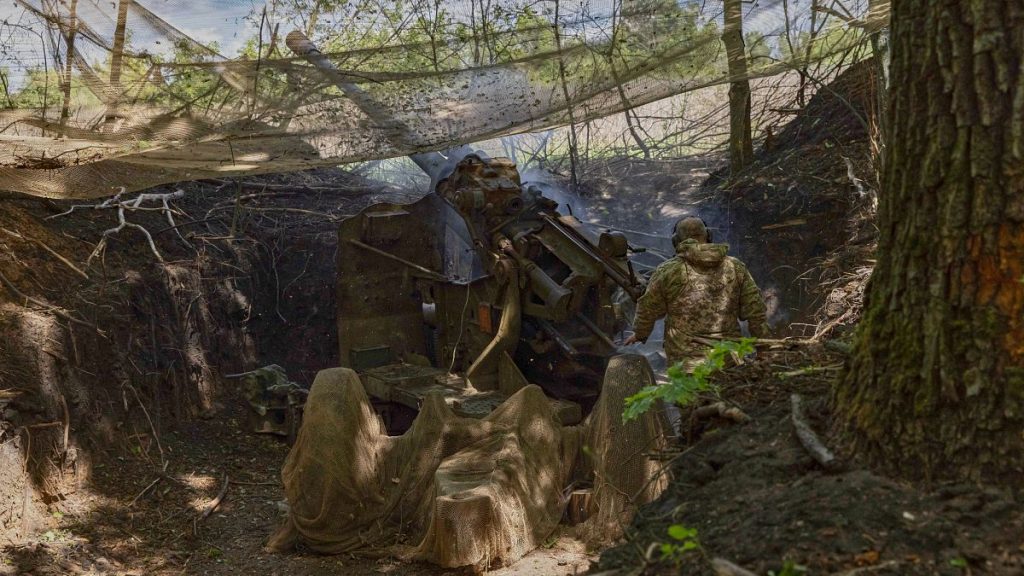On May 20, 2025, tensions surrounding the conflict in Ukraine remained palpable as a recent phone call between U.S. President Donald Trump and Russian President Vladimir Putin yielded little hope for an immediate peace agreement. Despite the optimistic tone of the call as expressed by Trump, many residents in Kyiv voiced skepticism regarding the feasibility of a peace deal prior to summer. As both sides continue to grapple with complex demands and stalled negotiations, the broader implications of the ongoing war are increasingly coming into focus.
| Article Subheadings |
|---|
| 1) Residents’ Reactions to Peace Prospects |
| 2) Trump’s Optimism vs. Reality |
| 3) The Recent Negotiation Dynamics |
| 4) Regional and International Responses |
| 5) The Road Ahead for Ukraine |
Residents’ Reactions to Peace Prospects
In Kyiv, the atmosphere is thick with apprehension regarding the potential for peace. Many residents express a conviction that an agreement is unlikely to materialize any time soon. Observers noted a prevailing sentiment that autumn may bring more favorable conditions for negotiations, with one local stating,
“(Peace) is possible closer to the autumn, not now; (Putin) will stall for time,”
reflecting the belief that further deterioration of the Russian military’s position is necessary to pave the way for meaningful discussions.
Another resident articulated a sense of frustration regarding the pace of diplomatic engagements. They underscored that leaders like Trump and Putin should have convened immediately following Trump’s inauguration in January, indicating that missed opportunities for dialogue may have exacerbated the current stalemate. The urgent desire for resolution is palpable, underscoring the dire humanitarian and socio-economic impacts felt throughout Ukraine amidst ongoing hostilities.
Trump’s Optimism vs. Reality
Despite widespread skepticism among Ukrainians, President Trump portrayed the recent phone call with Putin as productive. He took to social media to announce that ceasefire negotiations were set to commence “immediately.” This declaration has raised eyebrows, as the corresponding context appears to clash with the realities on the ground in Ukraine.
Trump’s optimism stands in stark contrast to the realities of a stalled peace process following failed negotiations in Istanbul last week. Putin notably declined an invitation for an in-person meeting with Ukrainian President Volodymyr Zelenskyy, delegating the responsibility to lower-ranking officials instead. This perceived snub reinforces the existing mistrust and highlights the disconnection between the assurances offered by the U.S. and the ongoing tumult in Ukraine.
The Recent Negotiation Dynamics
The recent round of talks in Istanbul has been described as a critical juncture, though ultimately unproductive. Both nations agreed to return 1,000 prisoners of war each, yet profound disagreements persisted, particularly regarding the conditions surrounding a proposed 30-day ceasefire put forth by U.S. officials and supported by Ukraine. While these developments were seen as a step forward, they also underscored significant gaps in agreement on essential issues.
President Zelenskyy vehemently rejected Russian demands which included the withdrawal of Ukrainian forces from four strategically critical regions—Donetsk, Luhansk, Zaporizhzhia, and Kherson. In response, Zelensky stated,
“Ukraine won’t withdraw its troops from its own territories,”
signaling a resolute stance against perceived Russian aggression and demands that infringe on Ukraine’s sovereignty.
Regional and International Responses
Following the stalled discussions, Germany’s Defence Minister Boris Pistorius accused Russia of merely buying time rather than demonstrating genuine interest in achieving a ceasefire. This assertion reflects a broader consensus among Western allies, who remain concerned about Russia’s strategic intentions in the region.
In response to the ongoing impasse and Russia’s perceived intransigence, the European Union has announced intentions to advance a new package of sanctions aimed at increasing pressure on Putin. This move underscores a collective commitment among international partners to hold Russia accountable while attempting to reinforce Ukraine’s defense.
The Road Ahead for Ukraine
As the situation unfolds, the path forward for Ukraine is fraught with challenges. The combination of military standoffs and diplomatic failures signals a prolonged period of uncertainty for both the state and its citizens. Observers note that the conflict may escalate if there are no significant shifts in negotiation strategies or military strategies from either side.
Ukrainians are increasingly concerned not only about the immediate impacts of ongoing military actions but also about the long-term repercussions of a delayed resolution. Many are hoping for a sustained effort towards peace that takes into account their sovereignty and territorial integrity. The ongoing instability raises critical questions about the future socio-economic conditions within Ukraine and the broader regional dynamics in Eastern Europe.
| No. | Key Points |
|---|---|
| 1 | Ukrainians express skepticism about an imminent peace deal. |
| 2 | Trump’s portrayal of the phone call with Putin contrasts with local sentiment. |
| 3 | Recent negotiations in Istanbul failed to yield tangible results. |
| 4 | Germany and the EU are pushing for more sanctions against Russia. |
| 5 | The future of Ukraine remains uncertain amid ongoing military and diplomatic tensions. |
Summary
As international negotiations yield limited results and regional dynamics remain tense, the prospect for peace in Ukraine appears dim. The divergent narratives between Western leaders and Ukrainian citizens contribute to a complex situation fraught with challenges. The international community’s commitment to accountability and support for Ukraine remains crucial as the country navigates its path amidst ongoing conflict.
Frequently Asked Questions
Question: What were the main outcomes of the recent Istanbul negotiations?
The Istanbul negotiations resulted in an agreement to exchange 1,000 prisoners of war but failed to establish a framework for a 30-day ceasefire.
Question: Why do many Ukrainians feel skeptical about a peace deal in the near future?
Many Ukrainians perceive that Russia is stalling to gain a strategic advantage, leading them to believe that significant progress towards peace is unlikely before the autumn.
Question: What steps is the EU taking in response to the ongoing conflict?
The European Union has announced intentions to impose a new package of sanctions aimed at increasing pressure on Russia to engage constructively in ceasefire talks.


